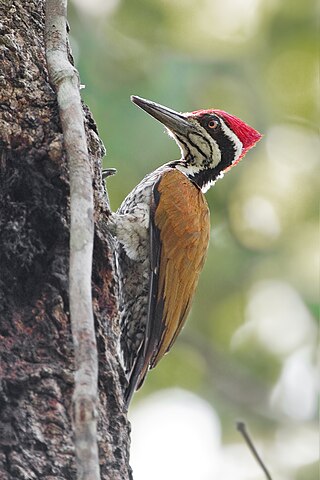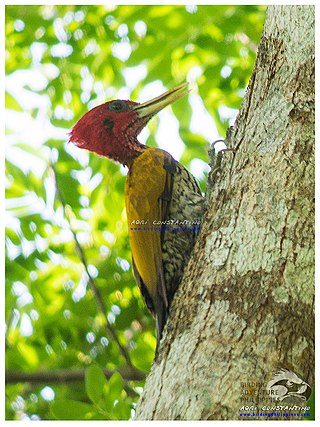
Picinae containing the true woodpeckers is one of four subfamilies that make up the woodpecker family Picidae. True woodpeckers are found over much of the world, but do not occur in Madagascar or Australasia.

Woodpeckers are part of the bird family Picidae, which also includes the piculets, wrynecks and sapsuckers. Members of this family are found worldwide, except for Australia, New Guinea, New Zealand, Madagascar and the extreme polar regions. Most species live in forests or woodland habitats, although a few species are known that live in treeless areas, such as rocky hillsides and deserts, and the Gila woodpecker specialises in exploiting cacti.

Chrysocolaptes is a genus of birds in the woodpecker family Picidae that are found in South and Southeast Asia.

Dinopium is a genus of birds in the woodpecker family Picidae. The species are found in South and Southeast Asia.

The black-rumped flameback, also known as the lesser golden-backed woodpecker or lesser goldenback, is a woodpecker found widely distributed in the Indian subcontinent. It is one of the few woodpeckers that are seen in urban areas. It has a characteristic rattling-whinnying call and an undulating flight. It is the only golden-backed woodpecker with a black throat and a black rump.

The greater flameback, also known as the greater goldenback or large golden-backed woodpecker, is a woodpecker species. It occurs widely in the northern Indian subcontinent, eastwards to southern China, the Malay Peninsula, Sumatra, western and central Java and northeast Borneo.

Campephilus is a genus of large American woodpeckers in the family Picidae.

Dryocopus is a genus of large powerful woodpeckers, typically 35–45 cm in length. It has representatives in North and South America, Europe, and Asia; some South American species are endangered. It was believed to be closely related to the American genus Campephilus, but it is part of a different lineage of woodpeckers altogether

The common flameback, also referred to as the common goldenback, is a small (28–30 cm), three-toed woodpecker in the family Picidae, found throughout South and Southeast Asia.

The olive-backed woodpecker is a species of bird in the woodpecker family Picidae that is found in Southeast Asia.

The Himalayan flameback, also known as the Himalayan goldenback, is a species of bird in the family Picidae. At the moment very little is known of this species and more fieldwork is required. The Himalayan flameback is not threatened but it is suspected that deforestation could severely affect the species population.

The crimson-backed flameback or greater Sri Lanka flameback is a species of bird in the woodpecker family Picidae that is endemic to Sri Lanka.

The buff-spotted flameback is a species of bird in the family Picidae. It is found on the Philippine islands of Bohol, Leyte, Samar, Biliran, Panaon, Mindanao, Basilan, and Samal. Along with the other Philippine species, Yellow-faced flameback, Luzon flameback, Red-headed flameback, it was formerly conspecific greater flameback
The spot-throated flameback is a species of bird in the family Picidae. It is endemic to the Philippines only being found in the province of Palawan in the islands of Balabac, Busuanga and Calamian and mainland Palawan.. It is sometimes considered a subspecies of the common flameback.It is found in moist lowland forests including primary, secondary and even plantations and clearings provided there are still standing trees. It is threatened by habitat loss.

The Luzon flameback is a species of bird in the family Picidae. It is found on the northern islands of Luzon, Polillo, Catanduanes and Marinduque, Philippines. It is sometimes considered a subspecies of the greater flameback.

The yellow-faced flameback is a species of bird in the family Picidae. It is found on the Philippine islands of Negros and Panay. It is extinct on Guimaras, Masbate, and Ticao (extinct). It is one of the most spectacular woodpeckers with its bright yellow head and crimson red back. It is sometimes considered a subspecies of the greater flameback. It is found in moist lowland forests including primary, secondary and even plantations and clearings provided there are still standing trees. It is the rarest woodpecker in the country and it is threatened by habitat loss.

The red-headed flameback is a species of bird in the family Picidae. It is endemic to the Philippines only being found in the region of Palawan in the islands of Balabac, mainland Palawan, Busuanga and Calamian. It is one of the most spectacular flamebacks with its bright red head and yellow-green back. It is sometimes considered a subspecies of the greater flameback. It is found in moist lowland forests including primary, secondary and even plantations and clearings provided there are still standing trees. It is threatened by habitat loss.

The Red-backed flameback, Lesser Sri Lanka flameback, Sri Lanka red-backed woodpecker or Ceylon red-backed woodpecker is a species of bird in the family Picidae. It is endemic to Sri Lanka, only absent in the far-north. It is sometimes considered a subspecies of the Black-rumped flameback.

















